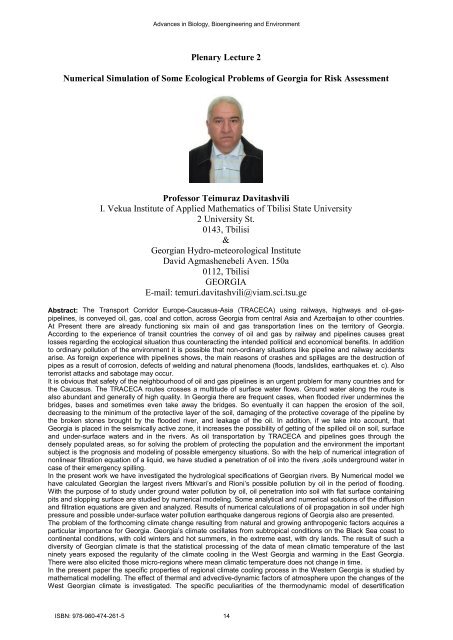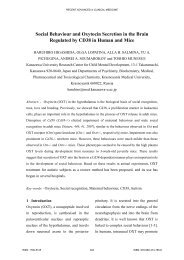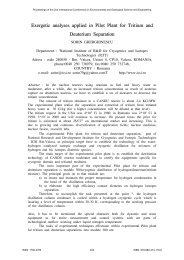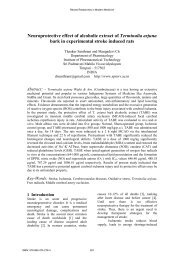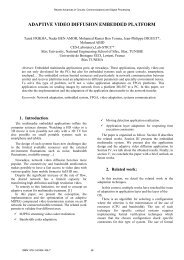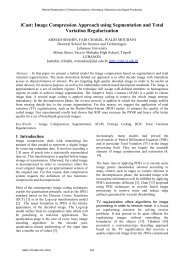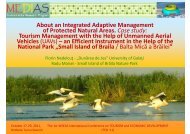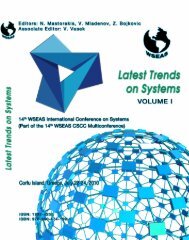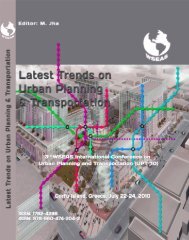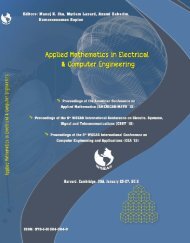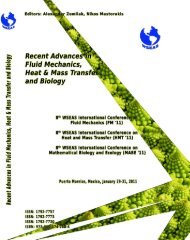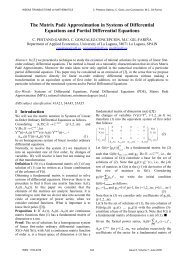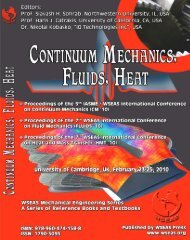ADVANCES in BIOLOGY, BIOENGINEERING and ... - Wseas.us
ADVANCES in BIOLOGY, BIOENGINEERING and ... - Wseas.us
ADVANCES in BIOLOGY, BIOENGINEERING and ... - Wseas.us
Create successful ePaper yourself
Turn your PDF publications into a flip-book with our unique Google optimized e-Paper software.
Advances <strong>in</strong> Biology, Bioeng<strong>in</strong>eer<strong>in</strong>g <strong>and</strong> Environment<br />
Plenary Lecture 2<br />
Numerical Simulation of Some Ecological Problems of Georgia for Risk Assessment<br />
Professor Teimuraz Davitashvili<br />
I. Vekua Institute of Applied Mathematics of Tbilisi State University<br />
2 University St.<br />
0143, Tbilisi<br />
&<br />
Georgian Hydro-meteorological Institute<br />
David Agmashenebeli Aven. 150a<br />
0112, Tbilisi<br />
GEORGIA<br />
E-mail: temuri.davitashvili@viam.sci.tsu.ge<br />
Abstract: The Transport Corridor Europe-Caucas<strong>us</strong>-Asia (TRACECA) <strong>us</strong><strong>in</strong>g railways, highways <strong>and</strong> oil-gaspipel<strong>in</strong>es,<br />
is conveyed oil, gas, coal <strong>and</strong> cotton, across Georgia from central Asia <strong>and</strong> Azerbaijan to other countries.<br />
At Present there are already function<strong>in</strong>g six ma<strong>in</strong> oil <strong>and</strong> gas transportation l<strong>in</strong>es on the territory of Georgia.<br />
Accord<strong>in</strong>g to the experience of transit countries the convey of oil <strong>and</strong> gas by railway <strong>and</strong> pipel<strong>in</strong>es ca<strong>us</strong>es great<br />
losses regard<strong>in</strong>g the ecological situation th<strong>us</strong> counteract<strong>in</strong>g the <strong>in</strong>tended political <strong>and</strong> economical benefits. In addition<br />
to ord<strong>in</strong>ary pollution of the environment it is possible that non-ord<strong>in</strong>ary situations like pipel<strong>in</strong>e <strong>and</strong> railway accidents<br />
arise. As foreign experience with pipel<strong>in</strong>es shows, the ma<strong>in</strong> reasons of crashes <strong>and</strong> spillages are the destruction of<br />
pipes as a result of corrosion, defects of weld<strong>in</strong>g <strong>and</strong> natural phenomena (floods, l<strong>and</strong>slides, earthquakes et. c). Also<br />
terrorist attacks <strong>and</strong> sabotage may occur.<br />
It is obvio<strong>us</strong> that safety of the neighbourhood of oil <strong>and</strong> gas pipel<strong>in</strong>es is an urgent problem for many countries <strong>and</strong> for<br />
the Caucas<strong>us</strong>. The TRACECA routes crosses a multitude of surface water flows. Ground water along the route is<br />
also abundant <strong>and</strong> generally of high quality. In Georgia there are frequent cases, when flooded river underm<strong>in</strong>es the<br />
bridges, bases <strong>and</strong> sometimes even take away the bridges. So eventually it can happen the erosion of the soil,<br />
decreas<strong>in</strong>g to the m<strong>in</strong>imum of the protective layer of the soil, damag<strong>in</strong>g of the protective coverage of the pipel<strong>in</strong>e by<br />
the broken stones brought by the flooded river, <strong>and</strong> leakage of the oil. In addition, if we take <strong>in</strong>to account, that<br />
Georgia is placed <strong>in</strong> the seismically active zone, it <strong>in</strong>creases the possibility of gett<strong>in</strong>g of the spilled oil on soil, surface<br />
<strong>and</strong> under-surface waters <strong>and</strong> <strong>in</strong> the rivers. As oil transportation by TRACECA <strong>and</strong> pipel<strong>in</strong>es goes through the<br />
densely populated areas, so for solv<strong>in</strong>g the problem of protect<strong>in</strong>g the population <strong>and</strong> the environment the important<br />
subject is the prognosis <strong>and</strong> model<strong>in</strong>g of possible emergency situations. So with the help of numerical <strong>in</strong>tegration of<br />
nonl<strong>in</strong>ear filtration equation of a liquid, we have studied a penetration of oil <strong>in</strong>to the rivers ,soils underground water <strong>in</strong><br />
case of their emergency spill<strong>in</strong>g.<br />
In the present work we have <strong>in</strong>vestigated the hydrological specifications of Georgian rivers. By Numerical model we<br />
have calculated Georgian the largest rivers Mtkvari’s <strong>and</strong> Rioni’s possible pollution by oil <strong>in</strong> the period of flood<strong>in</strong>g.<br />
With the purpose of to study under ground water pollution by oil, oil penetration <strong>in</strong>to soil with flat surface conta<strong>in</strong><strong>in</strong>g<br />
pits <strong>and</strong> slopp<strong>in</strong>g surface are studied by numerical model<strong>in</strong>g. Some analytical <strong>and</strong> numerical solutions of the diff<strong>us</strong>ion<br />
<strong>and</strong> filtration equations are given <strong>and</strong> analyzed. Results of numerical calculations of oil propagation <strong>in</strong> soil under high<br />
pressure <strong>and</strong> possible under-surface water pollution earthquake dangero<strong>us</strong> regions of Georgia also are presented.<br />
The problem of the forthcom<strong>in</strong>g climate change result<strong>in</strong>g from natural <strong>and</strong> grow<strong>in</strong>g anthropogenic factors acquires a<br />
particular importance for Georgia. Georgia’s climate oscillates from subtropical conditions on the Black Sea coast to<br />
cont<strong>in</strong>ental conditions, with cold w<strong>in</strong>ters <strong>and</strong> hot summers, <strong>in</strong> the extreme east, with dry l<strong>and</strong>s. The result of such a<br />
diversity of Georgian climate is that the statistical process<strong>in</strong>g of the data of mean climatic temperature of the last<br />
n<strong>in</strong>ety years exposed the regularity of the climate cool<strong>in</strong>g <strong>in</strong> the West Georgia <strong>and</strong> warm<strong>in</strong>g <strong>in</strong> the East Georgia.<br />
There were also elicited those micro-regions where mean climatic temperature does not change <strong>in</strong> time.<br />
In the present paper the specific properties of regional climate cool<strong>in</strong>g process <strong>in</strong> the Western Georgia is studied by<br />
mathematical modell<strong>in</strong>g. The effect of thermal <strong>and</strong> advective-dynamic factors of atmosphere upon the changes of the<br />
West Georgian climate is <strong>in</strong>vestigated. The specific peculiarities of the thermodynamic model of desertification<br />
ISBN: 978-960-474-261-5 14


